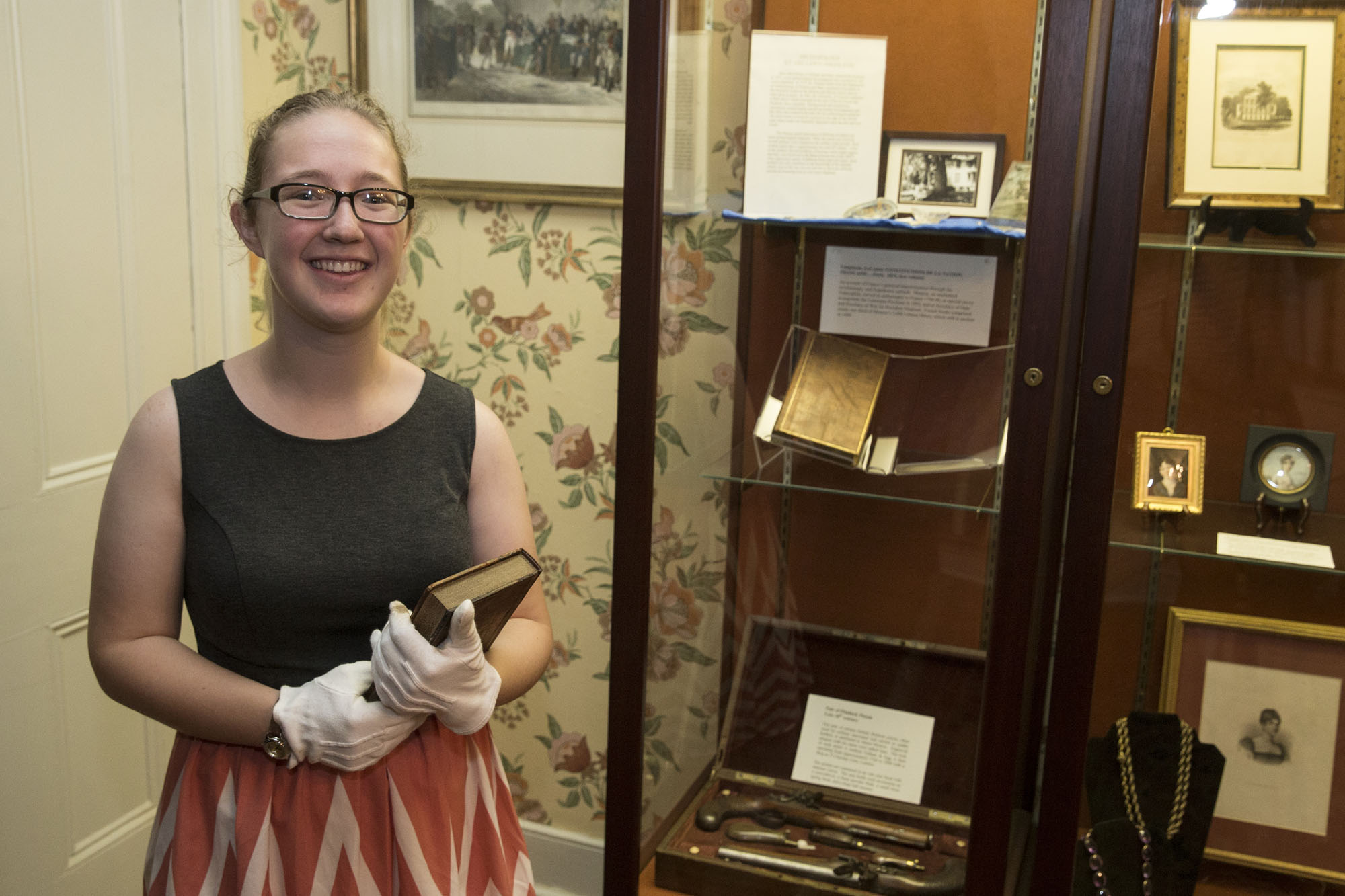A summer internship can require a lot of a college student: learning new skills, experiencing a profession firsthand, navigating the workplace.
For one rising University of Virginia fourth-year student, it also involved tracing the provenance of a centuries-old book back to the hands of the fifth U.S. president.
This summer, Ashley Spinks, a history and government major, worked at Ash Lawn-Highland, James Monroe’s historic estate, for her U.Va. Institute for Public History summer internship. While there, the executive director asked her to research a copy of “Constitutions de la Nation Française,” by French author Jean-Denis Lanjuinais.
Ash Lawn-Highland owns copies of about 30 titles that Monroe listed on a catalogue he kept that is used as a resource by Monroe scholars. Through an unusual turn of events, not much was known about the provenance of this one volume, until Spinks’ research.
The book had been purchased by the former executive director in 2012 from a private rare bookseller in Connecticut, Spinks said. However, it had not been highlighted in the museum’s current “Guide to the Collections.” To make matters more confusing, the museum has another copy of the same title that didn’t belong to Monroe.
Spinks researched the book’s acquisition information and verified its bookplate as coming from Monroe’s own library.
The volume is the only one in the collection specifically having come from his library, as far as Spinks and the museum staff have determined. “Ashley verified its origin when she dug into the book’s history,” Bon-Harper said.
“The moment I was sure I was right about the book being original,” Spinks said, “was when [former executive director] Carolyn Holmes reached out unexpectedly via e-mail with additional information about the purchase that could be added to the book’s accession folder.”
Spinks also researched the significance of the volume, written in French, which describes evolving constitutions of France. Author Lanjuinais had served in Napoleon’s senate and was an important figure – “He was a powerful politician and dissident who had the people’s respect,” Spinks said. Even though Lanjuinais, like Monroe, was critical of the French leader, Napoleon dubbed Lanjuinais a count.
The summer experience “made me feel like a real historian,” Spinks said. “The internship was a great opportunity. It was life-changing.”
Bon-Harper praised Spinks’ contributions. “Ashley came to Ash Lawn-Highland with the idea of choosing and telling stories about objects in our collection in ways that engage visitors,” she said. “She is very good at it!”
“Anything you do in a museum, I got to do,” said Spinks, who gave house tours twice a week, five or six a day.
Along with her work on the Monroe-owned book, she researched and updated information on the other books and objects in the collection. With Bon-Harper’s guidance, Spinks also designed a new exhibit on Monroe and foreign policy, writing new signage for the items.
One of the exhibited pieces is called a “tribute table.” The government of Santo Domingo (now Dominican Republic) sent the gift to Monroe after he addressed Congress on U.S. foreign policy in 1823, outlining a philosophy that came to be known as “the Monroe Doctrine.”
Spinks also collaborated on the creation of signs for a new demonstration crop garden, featuring Monroe’s views on farming, for example.
She said the website Founders Online was helpful for her research, enabling her to confirm dates and read correspondence between Monroe and other historic figures. The University of Virginia Press created the website in a partnership with the National Archives through its National Historical Publications and Records Commission.
“It’s more interesting to view Monroe in a human context. He was incredible because of the decisions he made,” she said.
The Institute for Public History, founded in 1996 at the University, sponsors about a dozen paid graduate and undergraduate student interns each summer at public history sites. Spinks wrote about her internship activities in weekly blogs to the director, Lisa Goff, and the other interns.
“Being able to contribute to the amazing work Ash Lawn-Highland does in sharing Monroe’s legacy was incredibly satisfying. As far as ‘touching something that Monroe touched’ – I honestly try not to think about it too much! I often find myself overwhelmed by the sheer amount of history objects can hold and portray,” Spinks said.
Media Contact
Article Information
August 18, 2015
/content/uva-intern-s-detective-work-confirms-james-monroe-owned-book

